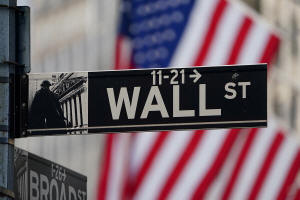Investors zero in on health of consumer with retail sales, earnings
 Send a link to a friend
Send a link to a friend
 [October 14, 2023] By
Lewis Krauskopf [October 14, 2023] By
Lewis Krauskopf
NEW YORK (Reuters) - Investors in the coming week will get a look at the
state of U.S. consumers - whose spending drives around two-thirds of the
economy - with a U.S. retail sales report and earnings due from Procter
& Gamble, Netflix and a slew of banks.
Durable consumer spending has been a key reason for the economy’s
resilience in the face of higher interest rates, with a
better-than-expected economy supporting stocks this year. The S&P 500 is
up about 13% year-to-date, though it has retreated roughly 6% from highs
reached in late July.
Retail sales data, due out on Tuesday, may have to walk a tightrope to
satisfy investors. A number that is far stronger than expected could
stir fears of a rebound in inflation and bolster worries that the
Federal Reserve will need to keep rates elevated for longer.
Conversely, a weak number could reignite concerns of an economic
downturn that the U.S. has so far managed to avoid, despite the Fed
raising borrowing costs to their highest levels in decades.
“It’s hyper-important to us because that’s really what has been
resilient in this economy," said Art Hogan, chief market strategist at B
Riley Wealth. "We really want to see what consumers are doing versus
what they’re saying.”

Retail sales are expected to have risen 0.3% on a monthly basis in
September, according to economists polled by Reuters.
As third quarter earnings season heats up, investors are also on guard
for signs that the conflict between Israel and Hamas is widening.
Investors headed to safe-haven assets such as Treasuries and gold on
Friday amid worries the conflict could intensify over the weekend.
There have been some signs that consumer strength may be wavering. A
survey on Friday showed U.S. consumer sentiment deteriorated in October,
with households expecting higher inflation over the next year. The third
straight monthly decline in sentiment reported by the University of
Michigan was nearly across all demographic groups.
Major U.S. banks on Friday warned the economy was slowing as customers
depleted their savings.
"There are a lot of questions around how the consumer is holding up,”
said Walter Todd, chief investment officer at Greenwood Capital.
[to top of second column] |

The Wall Street sign is pictured at the New York Stock exchange
(NYSE) in the Manhattan borough of New York City, New York, U.S.,
March 9, 2020. REUTERS/Carlo Allegri/File Photo

As earnings reports arrive, investors will also focus on comments
from bank executives about whether Americans are defaulting on loans
and paying back credit card debt. Bank of America reports results on
Tuesday, with a number of regional banks expected in the coming week
as well.
Earnings reports from other industries will also offer views on
consumer behavior. They include consumer products giant Procter &
Gamble, electric vehicle maker Tesla, streaming company Netflix,
casino operator Las Vegas Sands and America Airlines Group.
Todd, of Greenwood Capital, is focused on insight from companies
about the cumulative effect of "higher inflation and higher rates on
the consumer."
"Throw on top of that the student loan payments kicking back up,
that should all put incremental pressure on their ability to
potentially spend,” he said.
To be sure, a strong retail sales number could also spark concerns,
potentially renewing worries that a too-hot economy will push the
Fed to take a more hawkish interest rate stance.
Such an outcome could extend a rise in Treasury yields that has
pressured stocks in recent weeks. The U.S. 10-year benchmark yield
currently stands at 4.65%, after hitting a 16-year high earlier this
month. Jack Ablin, chief investment officer at Cresset Capital, said
he is looking for the benchmark Treasury yield to come "off the
boil" and fall to around 4.5%, boosting investors' appetite for
risk. "If indeed we see waning strength in consumer spending, that
will likely take some of the pressure off interest rates and the
Fed," Ablin said. “The conclusions from the consumer next week, I
think, is going to be bad news is good news."
(Reporting by Lewis Krauskopf; Editing by Ira Iosebashvili and
Jonathan Oatis)
[© 2023 Thomson Reuters. All rights
reserved.]
This material may not be published,
broadcast, rewritten or redistributed.
Thompson Reuters is solely responsible for this content.
 |